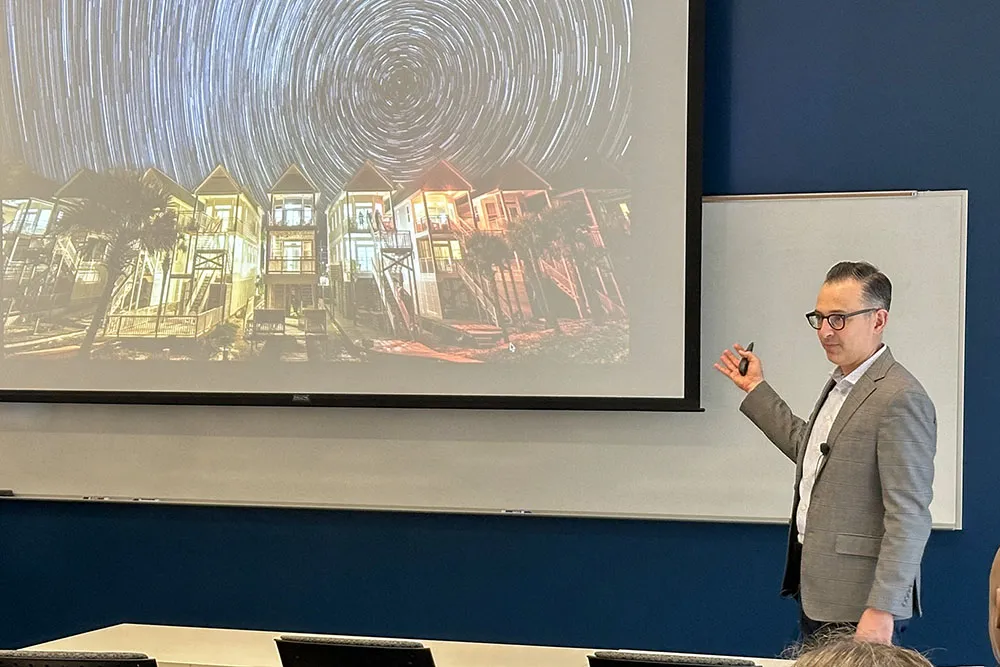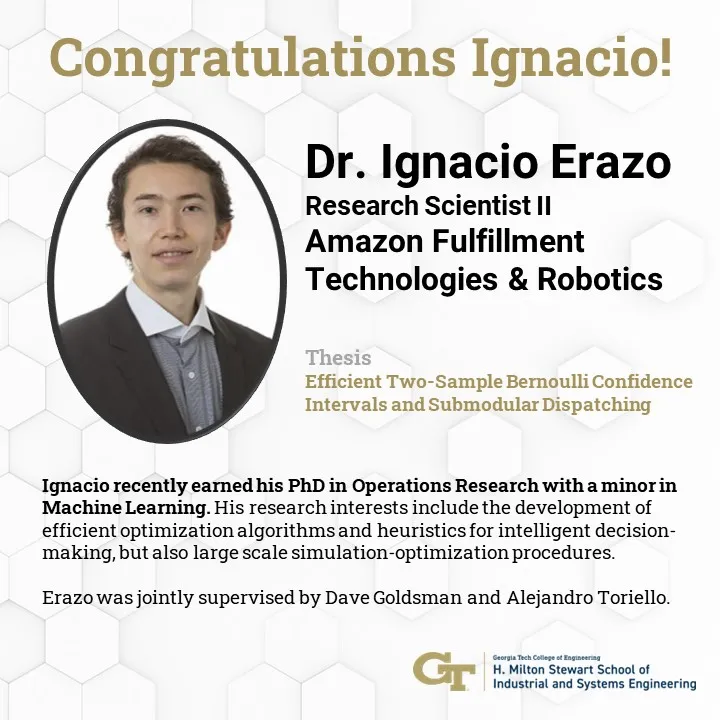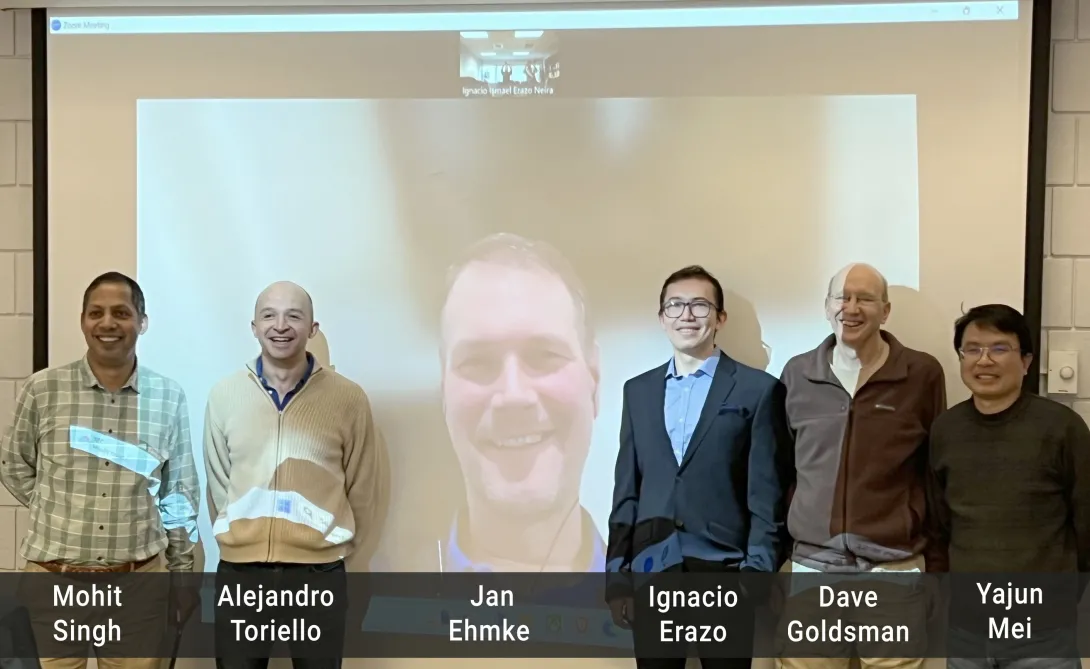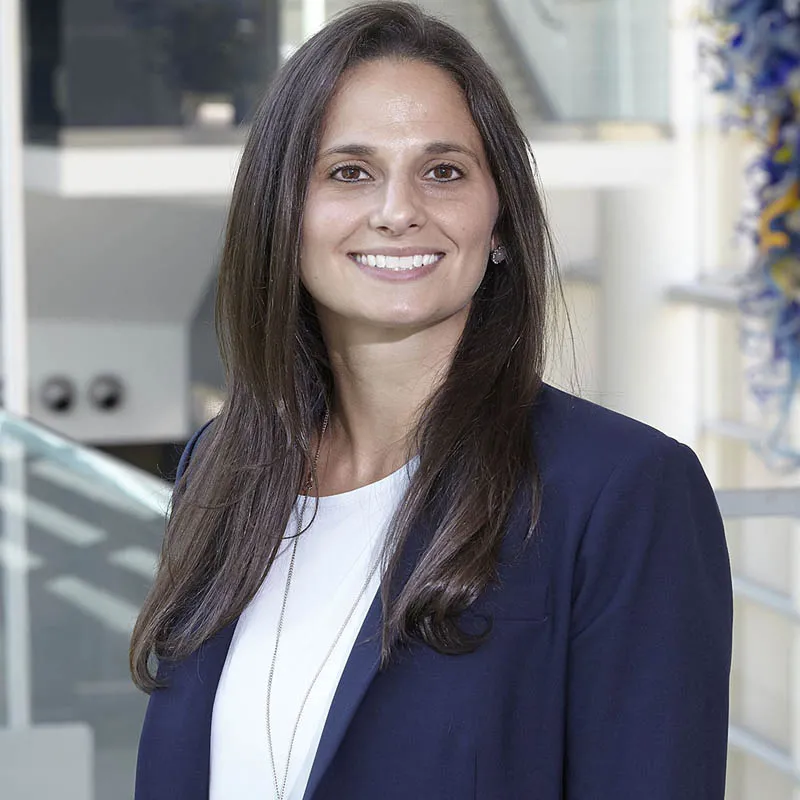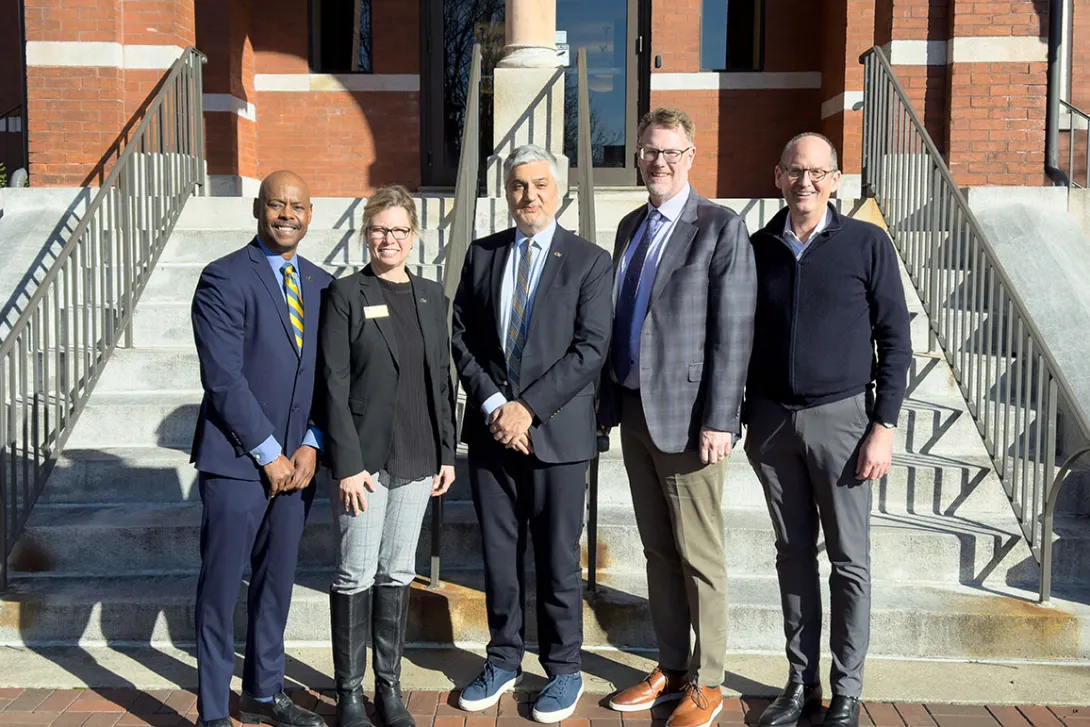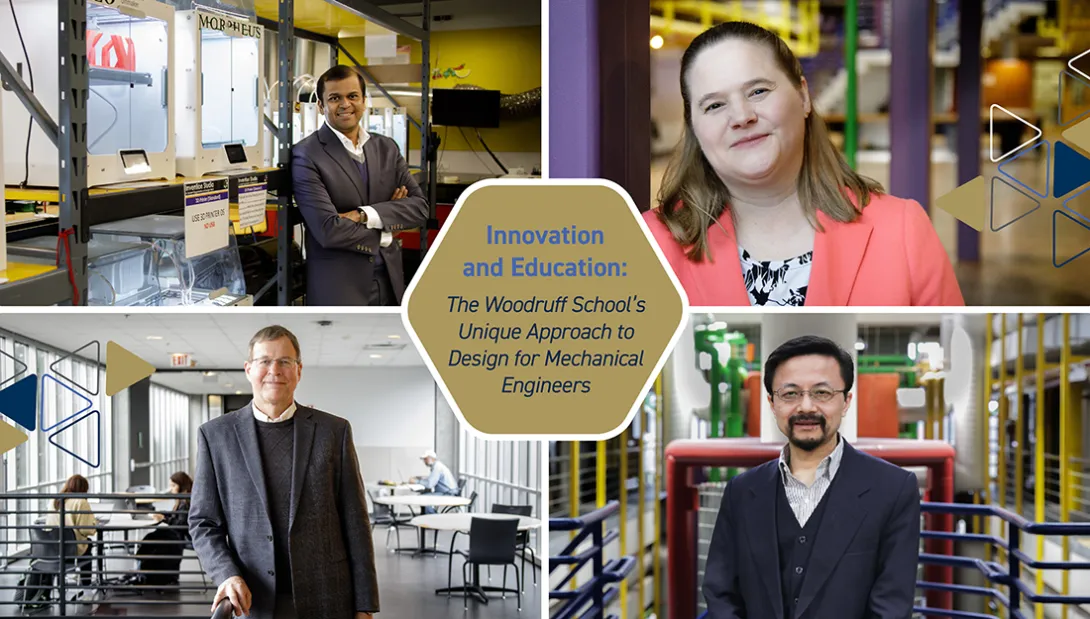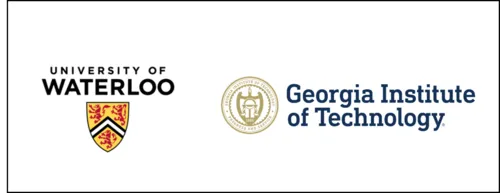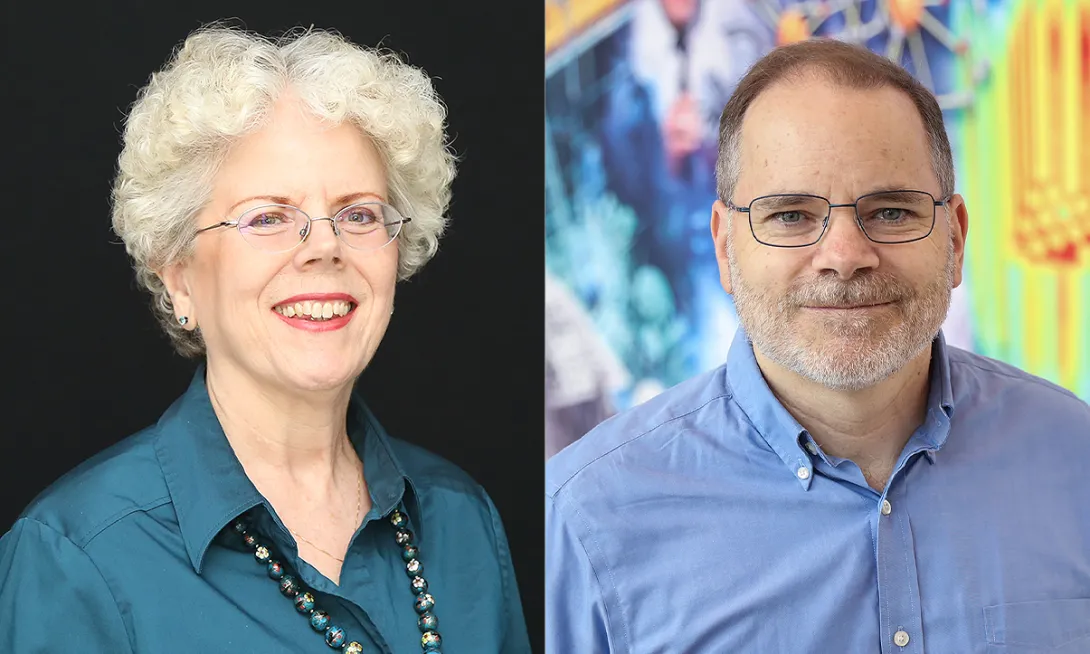Feb. 29, 2024
As we tap into the new year, alumnus Chris Gaffney (BSIE ’85, MSIE ’86) steps into his role as the Managing Director of the Supply Chain and Logistics Institute (SCL) and the Academic Program Director for Georgia Tech Professional Education (GTPE). With expertise in the field, his return to Georgia Tech welcomes fresh methods and inspiration to enhance the program's supply chain operations. Having earned both his degrees from the H. Milton Stewart School of Industrial and Systems Engineering (ISyE), Gaffney's journey intertwines deeply with the institution’s growth and impact.
Gaffney’s Return
"For the most part, I've only lived in two places in my life…growing up in DC and then living in Atlanta, I was very fortunate to choose Georgia Tech for both my bachelor's and master’s in industrial engineering." Throughout the years, Gaffney was involved in the community serving on the ISyE Advisory Board, Supply Chain and Logistics Industry Advisory Board, and the Mentees Program at Georgia Tech. Influenced by the ISyE community, Gaffney aims to reciprocate the school’s impact by leveraging his experiences from the Coca-Cola Company to enhance the program. In his new role, Chris wants to continue driving cross-collaboration with SCL partnerships. “Georgia Tech is on the leading edge of the advancements in supply chain and logistics, so I'm hopeful that part of what we could do more of in SCL is help companies access more of that, faster.” Additionally, Gaffney believes there’s an increasing urgency to advancing and “bringing people the type of learning in a way that they can grow their own professional capabilities [and become more multidisciplinary].”
Leadership in Logistics
Gaffney's professional journey began at Frito-Lay, where he navigated operational intricacies as a logistics analyst, later advancing to operations manager. Subsequently, he honed his expertise in international logistics and strategic supply chain management at AJC International and the Coca-Cola Company. Gaffney's tenure at Coca-Cola, spanning over two decades as the Director of National Distribution, and then VP of Transportation for US Coke, epitomizes his commitment to collaboration and innovation. "Coca-Cola taught me the importance of understanding how collaboration works within large enterprises and across companies." Internally, he also served in positions as President of Coca-Cola Supply, and as the President of the National Product Supplied Group, for the US Bottlers. For Gaffney, the journey wasn't just about personal success but about paving pathways for others, bridging the gap in the field between inspiration and accessibility.
Accessibility Through Collaboration
“-- A big part for me is this idea of, how do you bring the promise of the digital age of supply chain and make it accessible to more and more companies and people?” With the benefit of staying local, Gaffney supported driving academic, and corporate impact through collaboration – specifically towards initiatives aimed at increasing student co-ops, and full-time employment opportunities between Georgia Tech and the Coca-Cola Company. With mentorship serving as a cornerstone in Gaffney’s professional landscape, he believes in advocating for the transformative power of supportive relationships. “[My mentor] would make sure I was on track…it was a much smaller situation then, but it made a huge difference for me, and I never forgot about that -- I've had some really critical mentors early in my career, so I'm a big believer in mentoring and coaching.”
Yellow Jacket Trajectory
Gaffney’s ties to Georgia Tech, spanning decades of investment, characterize a lifelong commitment to growth and service. The motivation and influence instilled during his time at Tech transferred to his life in more ways than one. Chris met his wife at Georgia Tech and has been married for over 30 years; with four adult children, including one being a GT graduate in the field of Supply Chain. Even in hardship, Gaffney’s family is passionate about doing all they can, including relentlessly supporting one of their own as a childhood cancer survivor. They’re also heavily involved philanthropically, specifically in raising money for research on childhood cancer, “we believe that we have a responsibility to do what we can.” As Gaffney shared his final thoughts, he leaves us with a hopeful view, channeled in the moments where he started the beginnings of his career – back on Georgia Tech campus.
News Contact
info@scl.gatech.edu
Feb. 28, 2024
The Oliver Brand Memorial Technical Symposium was held on Feb. 22 at the Georgia Institute of Technology in honor of the technical achievements of Professor Oliver Brand.
The event brought together students, faculty, and professionals in the microelectromechanical systems research community to celebrate Brand’s contributions to the field and explore cutting-edge research.
“As a fellow academic, looking at his contributions, they’re remarkable,” said Mike Filler, interim executive director of the Institute for Electronics and Nanotechnology (IEN). “But then what put it over the top was his humanity. He supported every member of the community; he believed in people and had their best interests in mind.”
The seven speakers included research colleagues, graduate students and technical staff who worked closely with Brand throughout his career. They reminisced about Brand and discussed the research and technical achievements they collaborated on with him.
Brand spent more than 20 years as a member of the Georgia Tech faculty. In addition to leading IEN, he was a professor in the School of Electrical and Computer Engineering, director of the Coordinating Office for the NSF-funded National Nanotechnology Coordinated Infrastructure (NNCI), and director of the Southeastern Nanotechnology Infrastructure Corridor, one of the 16 NNCI sites.
Brand united researchers in the fields of electronics and nanotechnology, fostering collaboration and expanding IEN to include more than 200 faculty members. In addition to his respected work in the field of microelectromechanical systems, he is remembered for his kindness, dedication, and unwavering support toward all who knew him.
News Contact
Amelia Neumeister
Research Communications Program Manager
Feb. 28, 2024
Ignacio Erazo recently defended his thesis titled "Efficient Two-Sample Bernoulli Confidence Intervals and Submodular Dispatching", earning his PhD in Operations Research with a minor in Machine Learning under the supervision of Professors David Goldsman and Alejandro Toriello. Erazo's research interests involve the development of efficient optimization algorithms and heuristics for intelligent decision-making as well as large-scale simulation-optimization procedures. Collaborating with Professor Goldsman, he worked on the efficient computation of Confidence Intervals (CIs) for the difference of probabilities between two populations, with applications in health care, last-mile distribution, and production scheduling. This work is useful for many practical problems such as testing new drugs, evaluating inventory policies, estimating contamination rates, or evaluating the difference in rate of adverse events between generic and brand-name drugs. What is notable about his approach is that it uses fewer observations and generates lower costs. With Professor Toriello, Ignacio focused on problems where orders or items arrive at different times and must be processed or delivered in batches (e.g., e-commerce, machine scheduling). By using mathematical models and proposing new algorithms, the team studied the fundamental trade-offs between waiting for orders and batching them, such as obtaining economies of scale, versus the idleness of resources generated by that strategy. This problem has multiple applications in same-day delivery, machine scheduling, and production environments. This work has been presented at scholarly seminars, at multiple INFORMS Annual Meetings, and at the Transportation Science and Logistics (TSL) Conference. Notably, Ignacio's work was recognized with the Best Applied Student Paper Award at Winter Simulation Conference in 2022.
Prior to his doctoral studies at Georgia Tech, Ignacio obtained his degree in industrial civil engineering from the University of Concepcion in 2019. From a very young age, he loved doing math to solve problems and enjoyed participating in math competitions. "Without even recognizing it, I would obsess over taking the 'best' or optimal approach for everything I could. When I took my first optimization class it was obvious to me that this subset of extremely applied math (optimization, but in a broader sense Operations Research) was what I wanted to do in the future, and possibly forever. Essentially, at that point I already knew I wanted to deepen my knowledge, which meant the best course of action was to do a PhD in a university with the best professors." Reflecting on his journey, Ignacio shares his admiration for Georgia Tech's leading position in Operations Research, highlighting the wealth of expertise available within the department. "While Georgia Tech is not as known as other schools in the rest of the world (i.e., Stanford, Harvard, MIT), Georgia Tech leads almost every ranking related to OR. The department is extremely large and there is a professor working in almost every topic. Specific to optimization, logistics, and supply chain, we have a very large number of researchers and professors. That is the reason why GT was one of the only four places I applied to. Knowing what I know today, GT would be second to none."
Erazo’s professional experience includes internships as an applied and research scientist at tech giants Amazon and Apple where he contributed to cutting-edge projects in supply chain management and inventory optimization. At Apple, he was part of the team that develops science-based solutions for its supply chain. In particular, he worked on inventory management for Apple Stores and on "real-time" carrier selection for Apple's supply chain. His projects involved building new methodologies to solve those problems and coding prototypes that could serve as a starting point for deployment and production.
Recently, Erazo joined Amazon Fulfillment Technologies & Robotics as a Research Scientist II. Amazon operates an extensive and intricate supply chain that constantly advances by integrating robotic tools to boost warehouse efficiency. Within this dynamic framework, the algorithmic tools that enable its warehouses to work at their best need to be continuously modified, improved, and enhanced with new capabilities and use cases. Ignacio will meet the challenge by helping create, pilot, and seamlessly deploy new performance and safety-driven algorithms for Amazon's robotic-assisted picking warehouses across its entire network.
Ignacio's dedication to problem-solving and his passion for optimization exemplify the spirit of inquiry and innovation that defines our academic community. We congratulate him on this achievement and look forward to witnessing his continued contributions to the field.
News Contact
info@scl.gatech.edu
Feb. 21, 2024
Energy is everywhere, affecting everything, all the time. And it can be manipulated and converted into the kind of energy that we depend on as a civilization. But transforming this ambient energy (the result of gyrating atoms and molecules) into something we can plug into and use when we need it requires specific materials.
These energy materials — some natural, some manufactured, some a combination — facilitate the conversion or transmission of energy. They also play an essential role in how we store energy, how we reduce power consumption, and how we develop cleaner, efficient energy solutions.
“Advanced materials and clean energy technologies are tightly connected, and at Georgia Tech we’ve been making major investments in people and facilities in batteries, solar energy, and hydrogen, for several decades,” said Tim Lieuwen, the David S. Lewis Jr. Chair and professor of aerospace engineering, and executive director of Georgia Tech’s Strategic Energy Institute (SEI).
That research synergy is the underpinning of Georgia Tech Energy Materials Day (March 27), a gathering of people from academia, government, and industry, co-hosted by SEI, the Institute for Materials (IMat), and the Georgia Tech Advanced Battery Center. This event aims to build on the momentum created by Georgia Tech Battery Day, held in March 2023, which drew more than 230 energy researchers and industry representatives.
“We thought it would be a good idea to expand on the Battery Day idea and showcase a wide range of research and expertise in other areas, such as solar energy and clean fuels, in addition to what we’re doing in batteries and energy storage,” said Matt McDowell, associate professor in the George W. Woodruff School of Mechanical Engineering and the School of Materials Science and Engineering (MSE), and co-director, with Gleb Yushin, of the Advanced Battery Center.
Energy Materials Day will bring together experts from academia, government, and industry to discuss and accelerate research in three key areas: battery materials and technologies, photovoltaics and the grid, and materials for carbon-neutral fuel production, “all of which are crucial for driving the clean energy transition,” noted Eric Vogel, executive director of IMat and the Hightower Professor of Materials Science and Engineering.
“Georgia Tech is leading the charge in research in these three areas,” he said. “And we’re excited to unite so many experts to spark the important discussions that will help us advance our nation’s path to net-zero emissions.”
Building an Energy Hub
Energy Materials Day is part of an ongoing, long-range effort to position Georgia Tech, and Georgia, as a go-to location for modern energy companies. So far, the message seems to be landing. Georgia has had more than $28 billion invested or announced in electric vehicle-related projects since 2020. And Georgia Tech was recently ranked by U.S. News & World Report as the top public university for energy research.
Georgia has become a major player in solar energy, also, with the announcement last year of a $2.5 billion plant being developed by Korean solar company Hanwha Qcells, taking advantage of President Biden’s climate policies. Qcells’ global chief technology officer, Danielle Merfeld, a member of SEI’s External Advisory Board, will be the keynote speaker for Energy Materials Day.
“Growing these industry relationships, building trust through collaborations with industry — these have been strong motivations in our efforts to create a hub here in Atlanta,” said Yushin, professor in MSE and co-founder of Sila Nanotechnologies, a battery materials startup valued at more than $3 billion.
McDowell and Yushin are leading the battery initiative for Energy Materials Day and they’ll be among 12 experts making presentations on battery materials and technologies, including six from Georgia Tech and four from industry. In addition to the formal sessions and presentations, there will also be an opportunity for networking.
“I think Georgia Tech has a responsibility to help grow a manufacturing ecosystem,” McDowell said. “We have the research and educational experience and expertise that companies need, and we’re working to coordinate our efforts with industry.”
Marta Hatzell, associate professor of mechanical engineering and chemical and biomolecular engineering, is leading the carbon-neutral fuel production portion of the event, while Juan-Pablo Correa-Baena, assistant professor in MSE, is leading the photovoltaics initiative.
They’ll be joined by a host of experts from Georgia Tech and institutes across the country, “some of the top thought leaders in their fields,” said Correa-Baena, whose lab has spent years optimizing a semiconductor material for solar energy conversion.
“Over the past decade, we have been working to achieve high efficiencies in solar panels based on a new, low-cost material called halide perovskites,” he said. His lab recently discovered how to prevent the chemical interactions that can degrade it. “It’s kind of a miracle material, and we want to increase its lifespan, make it more robust and commercially relevant.”
While Correa-Baena is working to revolutionize solar energy, Hatzell’s lab is designing materials to clean up the manufacturing of clean fuels.
“We’re interested in decarbonizing the industrial sector, through the production of carbon-neutral fuels,” said Hatzell, whose lab is designing new materials to make clean ammonia and hydrogen, both of which have the potential to play a major role in a carbon-free fuel system, without using fossil fuels as the feedstock. “We’re also working on a collaborative project focusing on assessing the economics of clean ammonia on a larger, global scale.”
The hope for Energy Materials Day is that other collaborations will be fostered as industry’s needs and the research enterprise collide in one place — Georgia Tech’s Exhibition Hall — over one day. The event is part of what Yushin called “the snowball effect.”
“You attract a new company to the region, and then another,” he said. “If we want to boost domestic production and supply chains, we must roll like a snowball gathering momentum. Education is a significant part of that effect. To build this new technology and new facilities for a new industry, you need trained, talented engineers. And we’ve got plenty of those. Georgia Tech can become the single point of contact, helping companies solve the technical challenges in a new age of clean energy.”
News Contact
Feb. 15, 2024
Artificial intelligence is starting to have the capability to improve both financial reporting and auditing. However, both companies and audit firms will only realize the benefits of AI if their people are open to the information generated by the technology. A new study forthcoming in Review of Accounting Studies attempts to understand how financial executives perceive and respond to the use of AI in both financial reporting and auditing.
In “How do Financial Executives Respond to the Use of Artificial Intelligence in Financial Reporting and Auditing?,” researchers surveyed financial executives (e.g., CFOs, controllers) to assess their perceptions of AI use in their companies’ financial reporting process, as well as the use of AI by their financial statement auditor. The study is authored by Nikki MacKenzie of the Georgia Tech Scheller College of Business, Cassandra Estep from Emory University, and Emily Griffith of the University of Wisconsin.
“We were curious about how financial executives would respond to AI-generated information as we often hear how the financial statements are a joint product of the company and their auditors. While we find that financial executives are rightfully cautious about the use of AI, we do not find that they are averse to its use as has been previously reported. In fact, a number of our survey respondents were excited about AI and see the significant benefits for their companies’ financial reporting process,” says MacKenzie.
Continue reading: The Use of AI by Financial Executives and Their Auditors
Reprinted from Forbes
News Contact
Lorrie Burroughs, Scheller College of Business
Feb. 15, 2024
The Georgia Institute of Technology today announced the signing of a master research agreement with Micron Technology, a global leader in memory and storage solutions. Under the new agreement, the two organizations will expand their collaborative efforts in providing students with experiential research opportunities and expanding access to engineering education.
“We are proud to join forces with Georgia Tech, home to some of the nation’s top programs, to expand students’ opportunities in STEM education,” said Scott DeBoer, executive vice president of Technology and Products at Micron. “This collaboration will help push the boundaries in memory technology innovation and ensure we prepare the workforce of the future.”
“We believe that when academia and industry converge, the best ideas flourish into game-changing innovations,” said Chaouki T. Abdallah, executive vice president for Research at Georgia Tech. “The synergy between Micron and Georgia Tech has already been tremendously fruitful, and we are so excited for the boundless opportunities on our shared horizon.”
“The signing of the master research agreement represents a significant step towards increasing additional collaboration pathways between Micron and GT including the joint pursuit of major federal funding activities, technology transfer, student internships and technology transfer,” said George White, senior director of Strategic Partnerships at Georgia Tech.
The first project under the agreement is already underway. Saibal Mukhopadhyay, professor in the School of Electrical and Computer Engineering, is leading the research efforts titled “Configurable Processing-In-Memory.” This cutting-edge research will enable memory devices to work faster and more efficiently.
News Contact
Amelia Neumeister
Research Communications Program Manager
Feb. 13, 2024
Mechanical engineering, in the broadest sense of the discipline, touches a vast array of processes and systems, encompassing familiar industries and niche startups. Rapid technology advances mean engineering skills and methods change frequently to adapt to newer materials, tools, or customer needs. At its core, however, the intersection of design and innovation drives engineering, shaping the future of products and manufacturing processes. At the forefront of this intersection is the George W. Woodruff School of Mechanical Engineering at Georgia Tech, well known for its commitment to design education and unique approach to understanding the crucial role design plays in educating future engineers.
News Contact
Ian Sargent
Feb. 12, 2024
If you’ve spent even an hour or two on ChatGPT or another generative AI model, you know that getting it to generate the content you want can be challenging and even downright frustrating.
Prompt engineering is the process of crafting and refining a specific, detailed prompt — one that will get you the response you need from a generative AI model. This kind of “coding in English” is a complex and tricky process. Fortunately, our faculty at the Ivan Allen College of Liberal Arts at Georgia Tech are engaged in teaching and research in this exciting emerging field.
I met with Assistant Professor Yeqing Kong in the School of Literature, Media, and Communication to talk about prompt engineering. She shared three approaches to crafting a prompt that she has collected from leading experts, and invited me to try them out on a prompt. Read the full story.
News Contact
Stephanie N. Kadel
Ivan Allen College of Liberal Arts
Feb. 12, 2024
The University of Waterloo and the Board of Regents of the University System of Georgia, representing Georgia Institute of Technology (Georgia Tech), have officially entered a Memorandum of Understanding (MOU) to strengthen academic and research ties between the two institutions. The MOU signifies a commitment to fostering collaborative initiatives in research, education, and other areas of mutual interest. Both universities, recognized for their global impact and innovation, are eager to embark on this journey of cooperation.
Charmaine Dean, Vice-President of Research & International, shared, “The University of Waterloo is pleased to embark on a new collaboration with Georgia Tech, featuring faculty and student exchanges, joint research projects, dual degrees, and conferences. Strengthening ties between our institutions through this collaboration creates a dynamic environment for our faculty and students to foster innovation in many areas of mutual excellence.”
“Georgia Tech is excited to see its NSF AI Institute for Advances in Optimization (AI4OPT), under the leadership of Prof. Pascal Van Hentenryck, partner with experts from the Waterloo Artificial Intelligence Institute of the University of Waterloo. I am really looking forward to the impact that this partnership will have in advancing the fundamental knowledge of AI, in further expanding its applications, and in enabling its wider adoption,” noted Prof. Bernard Kippelen, Vice Provost for International Initiatives at Georgia Tech.
This collaboration is poised to elevate the academic and research landscape of both institutions, promoting global engagement and creating opportunities for students and faculty to thrive in an interconnected world.
News Contact
Breon Martin
Feb. 07, 2024
Two College of Engineering professors are among the newest members of the National Academy of Engineering (NAE), the organization announced Feb. 6.
Patricia Mokhtarian and David Sholl are part of a 2024 class that includes 114 new members and 21 international members. Election to the NAE is among the highest professional recognitions for engineers and an honor bestowed on just 2,600 professionals worldwide.
New members are nominated and voted on by the Academy’s existing membership. With Mokhtarian and Sholl, Georgia Tech now has 48 NAE members.
News Contact
Joshua Stewart
College of Engineering

